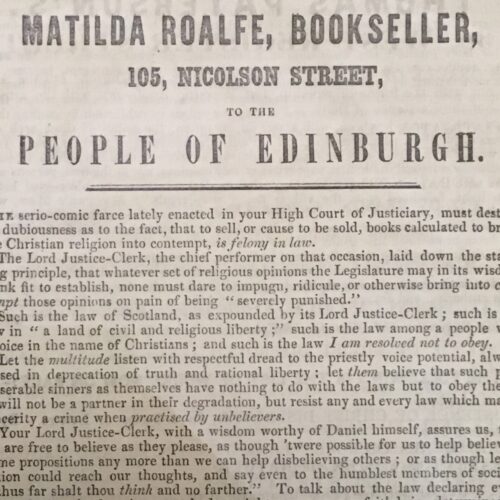

I will never voluntarily obey any law which is an outrage on human reason.
Matilda Roalfe
Matilda Roalfe was an atheist and radical publisher; a staunch defender of the freedom of non-belief, and a devotee of reason. Imprisoned for selling freethought literature, Roalfe launched a powerful and eloquent defence, pledging to continue the sale of the offending materials. George Jacob Holyoake described her as being ‘as remarkable for quiet courage as for good sense’, standing for ‘the right of freedom of the press in honest criticism and speculation.’ In this, she was a central part of the humanist defence of liberty and rationalism during the 19th century, continued by humanists and secularists today.
Matilda Roalfe was born in England in 1813. Although not originally from Scotland, it was there she became especially notable within the freethought movement, having been invited to take over the Edinburgh shop of a radical bookseller. She then opened her own ‘atheistical depot’, operating as Matilda Roalfe & Co. booksellers and newsagents from 105 Nicolson Street, Edinburgh. In December 1843, the shop was raided and Roalfe taken to jail. In a letter to the Northern Star, it was stated that she was:
Shown into a filthy cell, scarcely fit for a dog kennel, for her night’s lodging place. Miss Roalfe remonstrated with the matron, and eventually she was indulged with the privilege of removing to a cell where there was no vermin!
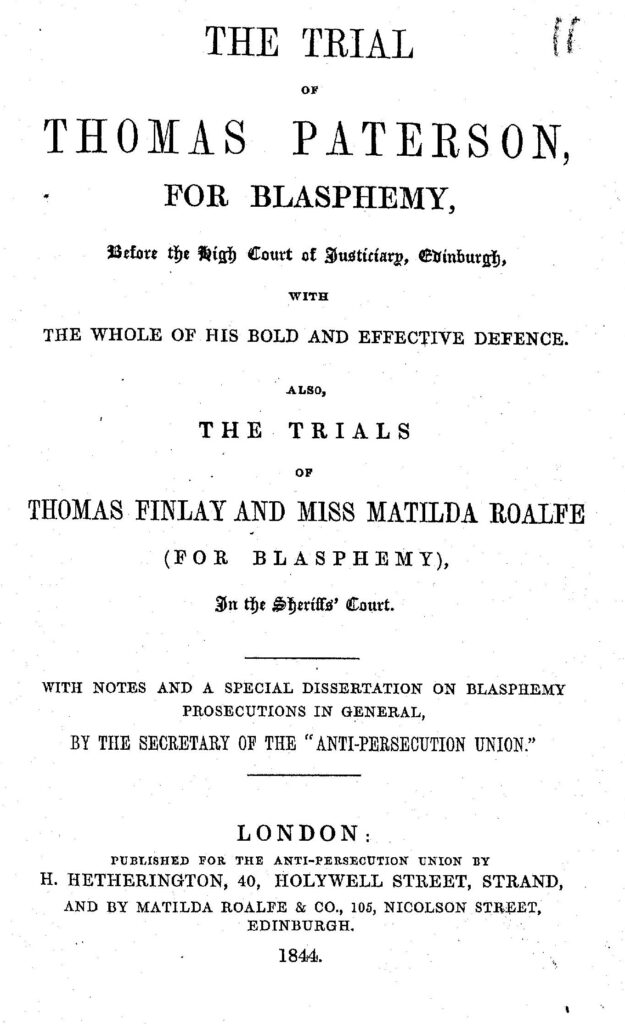
Defending Roalfe, the letter’s author, Henry Jeffery, secretary of the newly established Scottish Anti-Persecution Union, decried the prosecution, arguing that ‘she did nothing that could shock the feelings of any person with any particle of a claim to rationality’. Nevertheless, on 23 January 1844, Matilda Roalfe was charged with selling ‘certain works of a blasphemous nature’ and sentenced to sixty days in Calton Jail. After serving her sentence, she resumed the sale of said works, among them Paine’s Age of Reason, and radical journal The Oracle of Reason.
In ‘Law Breaking Justified’ (1844), Roalfe emphasised the tyrannical nature of blasphemy laws, invoking Greco-Roman examples of resistance to oppression. She also suggested that the very existence of blasphemy laws implies the existence of non-believers, and that many people might not attend church or follow Christianity were they not impelled to do so. Roalfe’s strongly worded manifesto, ‘To the People of Edinburgh’, made plain her commitment to the cause, promising to ‘resist any and every law which makes sincerity a crime when practised by unbelievers’. She stated that:
To aid in destroying the influence of such men [priests and other religious leaders], by bringing into contempt the fabulous trash they palm upon the ever-credulous, ever-deceived multitude, as genuine religion, is the great, the sole object of my ambition. I neither hope nor fear any thing from authority, and am resolved to supply the Public with works of a controversial and philosophical character.
Below, she printed a list of works for sale in her shop, which included ‘Paine’s Age of Reason’, ‘Volney’s Ruins of Empires’, ‘Rights of Woman’, and ‘Voltaire’s Philosophical Dictionary’. In a later letter from Roalfe to The Movement, she wrote:
I think we may consider that we have won the battle of mental freedom in this city, as I have the place regularly placarded with bills, advertising the sale of the “Existence of God Disproved,” “The Bible an Improper Book,” etc. and not the slightest notice taken, except that I am looked upon as a sort of she devil, by the saints.
Roalfe married Walter Sanderson, a close colleague of Holyoake’s at Fleet Street House, and settled at 10 Hill Street, Galashiels. They had two daughters: Mary and Janet. Matilda Sanderson died in Galashiels on 29 November 1880.
All human law which is in harmony with the Law of Reason, it has ever been, and, I trust, will ever be, my pride to respect and obey; but that law, whether it be called Christian or any other name, which is an outrage upon human reason, I never will voluntarily obey.
Matilda Roalfe
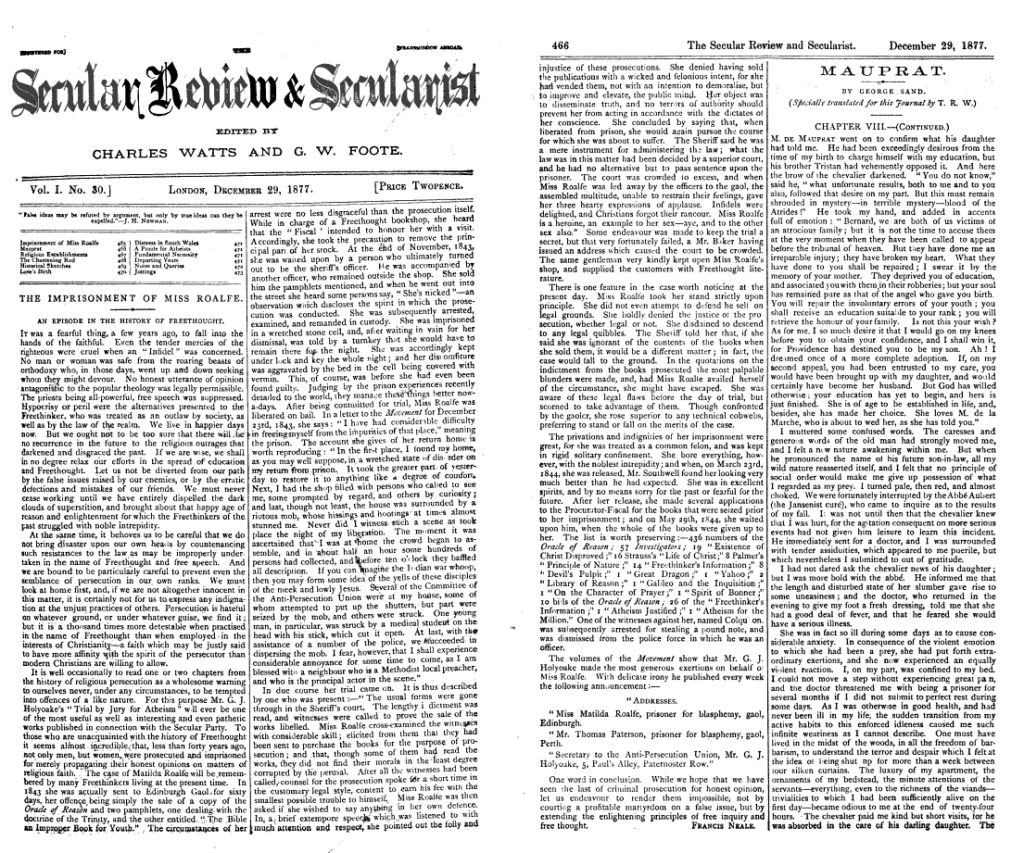
Matilda Roalfe is a powerful example of the freethinking woman of the 19th century, who risked being tarred as a ‘she devil’ in the name of reason and conscience. Like other radical secularists of the time, her blasphemy trial was published widely, these trials being, as Holyoake wrote:
…enduring testimonies against religion, records of noble struggles for liberty, and repositories of the best arguments in favour of impiety.
In Roalfe’s case, as in those of Susannah Wright and others like her, they also reveal the existence and prominence of women in the secularist tradition: declaring a carefully reasoned atheism, and bravely championing humanist values in the face of outrage and prosecution.
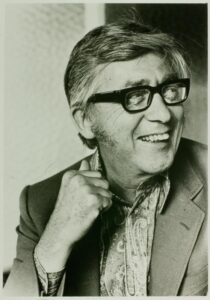
Because no one will believe without a splash from a fontTheir baby will howl in eternal cold, or fire,And no […]
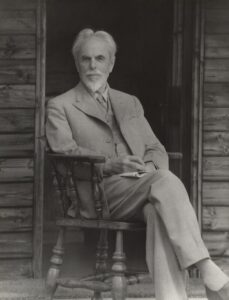
But however little it conforms or tenders allegiance, no life worth having can be isolated from the lives of others. […]
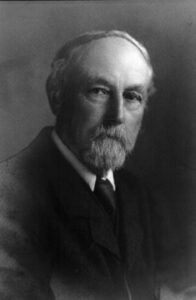
The Humanitarian League is a Society of thinkers and workers, irrespective of class or creed, who have united for the […]
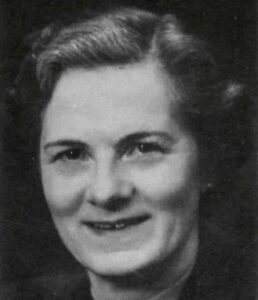
With these basic [humanist] beliefs there go commonly two corollaries. First, that virtue is a matter of promoting human well-being, […]